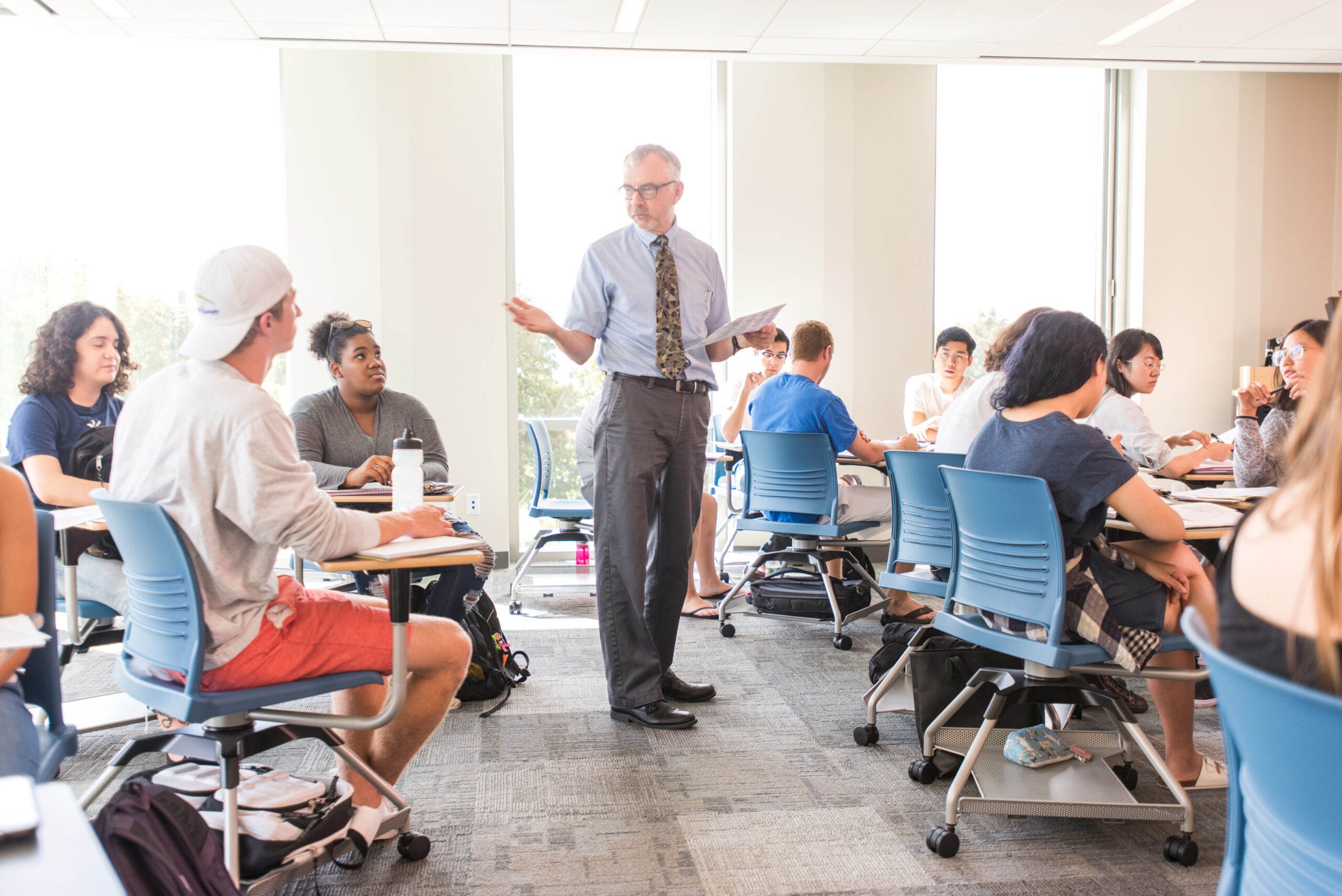‘I never felt like I had to stay in one lane’

For roughly 20 years, economics Professor John Brown has been taking his students on walks through Worcester’s Main South, observing the revitalization of Clark’s neighborhood.
It’s dramatically different than the Main South of 1986, when Brown first arrived on campus.
“When I started teaching at Clark, Worcester was a very challenged city, as were most old industrial cities in Massachusetts,” recalls Brown, who is retiring after 37 years at the University.
At the time, some colleges and universities were departing their urban homes and relocating to the suburbs in search of larger, greener campuses. Brown and economics Professor Jacqueline Geoghegan collaborated on a paper evaluating the impact of Clark’s decision to remain in Main South — and invest in it.
“Under former President Richard Traina, Clark decided to engage with its neighborhood,” Brown remembers. “The University participated in the Main South revival, in particular with the University Park Partnership, which I think has had a profound impact on the lives of people in the neighborhood, but also clearly on Clark, too.”
For the urban economist and economic historian, Worcester has been an intriguing home base. As a visiting scholar at the Federal Reserve Bank in Boston, Brown examined how changes in the manufacturing economy affected neighborhood development, a subject for which Worcester was a perfect case study.
“Worcester started a revival in the ’90s, and that’s continued to the present day with all the development we’ve seen around the Canal District, such as the new Polar Park baseball stadium, as well as the development that also took place in our own neighborhood,” he says.
Brown was attracted to Clark’s Economics Department because he could teach at the undergraduate and Ph.D. levels.
“One great thing about my experience at Clark is that I’ve been able to allow my numerous research interests to unfold. I’ve never felt like I had to stay in one particular lane,” he says.

Research will be a focal point of Brown’s first few months of retirement. He plans to spend the summer and fall devoting his new free time to ongoing projects with colleagues. He and fellow economics Professor David Cuberes are researching Oklahoma’s urban development. After native people were pushed out of Oklahoma, settlers started a new urban system. The two are trying to understand the long-term impacts of that transition.
Brown will also continue an ongoing project with Daniel Bernhofen, a former Clark professor who now teaches at American University, studying the Japanese economy. Up to the middle of the 19th century, Japan didn’t trade with other countries. After being virtually isolated for more than three hundred years, by 1860 Japan found itself competing in a world that included the advanced industrial economy of Britain. Brown and Bernhofen are analyzing how the influx of imported goods and opportunities to trade affected the Japanese economy.
Brown received his Ph.D. and master’s degrees from the University of Michigan in 1987 and 1984, respectively, and a bachelor’s degree from the University of Wisconsin in 1978. He was initially drawn to the public policy applications of economics, particularly urban questions. His dissertation analyzed the urban issues cities 19th-century Germany faced as they expanded rapidly, particularly cholera epidemics, typhoid, and the disposal of household waste. Brown sought to understand how policy responses could make the cities healthier.
Brown has enjoyed watching former students move on to prominent positions in the public and private sectors. One former student is a planner with the Federal Transportation Administration in Philadelphia, another is an urban planner in Pittsburgh, and a third has worked with the Central Massachusetts Regional Planning Commission. Mahesh Ramachandran, Ph.D. ’10, has served as an economist for the Commonwealth of Massachusetts.
“It’s very exciting to see how he’s excelled in his profession,” says Brown. “It’s rewarding to watch former students make important contributions both in the for-profit sector and the nonprofit sector.”
A member of the Phi Beta Kappa Society, Brown has participated in annual receptions for new inductees. He’s also worked with Clark’s Economic Society.
In the past three decades, technology has transformed the undergraduate program into something unimaginable during his start at Clark, Brown says.
“Student research projects are far in excess of what I could have imagined in the mid- or late-1980s,” he says. “Some students work with data sets of millions of observations. These very sophisticated kinds of statistical analysis are a huge change from what students encountered when I started teaching.”
Brown has taught the economics introduction course for his full 37 years at Clark and statistics for 25 years. During his urban economics courses, Brown often invited former students to speak — in person or, more recently, on Zoom — about how they’ve used their Clark degree.
Students in the ’90s often wanted to major in economics to work on Wall Street. Today, Brown finds his students have broader interests and expanded research skills. Students in the Urban Economics course have recently found pathways into careers in the private sector, consulting on questions about real estate, or public-facing positions like city planning.
Brown has had the privilege of instructing many students from their first-year intro class to their senior thesis or capstone.
“Seeing a student take on a project, learn how to ask new questions, work with data, is exciting,” he says. “Graduating students are the same person who started at Clark, just with enhanced capabilities. That’s the real benefit of a liberal arts education in the supportive environment that Clark offers its students.”


